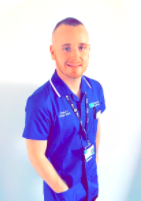
This blog was written by David Ferran, Deputy Charge Nurse, Dermatology Department, Royal Victoria Hospital.
When the World Health Organization designated 2020 “International Year of the Nurse & the Midwife” I expected lots of celebrations, looking back at our history and honouring those who have helped to shape modern nursing. I’ve always been very proud to be a nurse and feel it’s a real privilege to care for people in what can be their darkest days. I currently Co-Chair Northern Ireland’s Valuing Diversity in Nursing group, and the Nursing Now campaign has provided us with an excellent platform to showcase nursing as a rewarding career choice to potential future nurses.
Nursing Now has a strong focus on providing leadership and development opportunities for nurses and midwives, as one of 20 Belfast Nightingales selected to take part in the Nursing Now Nightingale Challenge, we looked forward to a year of learning. Little did we know, a pandemic was on the horizon and the global nursing community was about to face unimaginable challenges.
As a Deputy Charge Nurse in a Dermatology department (a somewhat unknown entity in nursing) how has the COVID-19 pandemic affected me and my colleagues? The answer… there isn’t an area, branch, specialty or nursing role that hasn’t been greatly affected by the COVID-19 pandemic.
The urgent and overwhelming need for acute and critical care at this time has meant nurses, midwives, students and nursing assistants have faced challenges within their practice that they have never experienced on this scale before. Redeployment, upskilling, and a call for help to nursing students and retired colleagues have all taken place at incredible speed.
Over the past few weeks, I’ve experienced some of the most challenging and sometimes upsetting situations I’ve encountered in my fifteen years working in healthcare. Comforting those who have lost family members without being able to physically see them, comforting unwell patients who don’t know when they will see their loved ones again. At a time when human touch and the presence of family and friends can mean so much, nurses stand ready to step in and be that comfort, that ear to listen, that hand to hold.
I’ve spent the past two weeks working at Belfast’s first COVID-19 assessment centre, a service set up within a matter of days that provides symptomatic patients with the care they need at the right time, in the right setting, with the right healthcare professional. It’s been a very busy two weeks; the patient caseload has doubled within seven days and it’s expected to rise again sharply in the coming weeks.
Within the next few weeks, my colleagues and I will move to a new intensive care department at the Belfast Nightingale hospital. We have been provided with upskilling sessions and training via video link by our amazing and adaptable educationalists at the HSC Clinical Education Centre. Will a short training course make me an intensive care nurse? Absolutely not, but it will enable me to utilise my existing knowledge and skills as a registered nurse to support my intensive care colleagues who are providing care at the most difficult of times.
Every day since this began, I’ve been humbled by the commitment of nurses who have made, and continue to make such personal sacrifices. Nurses who have left their families to provide care to others, nurses who have family members who are critically unwell due to COVID-19 while they continue to provide frontline care. We hear daily of nursing colleagues across the globe who have lost their lives while protecting others, walking towards danger while asking others to stay at home.
For now, the celebrations are on hold but we will celebrate, we will promote our profession and we will have a renewed appreciation for the simple things; a normal day, spending time with family and working alongside such a dedicated team of caring and supportive professionals.


